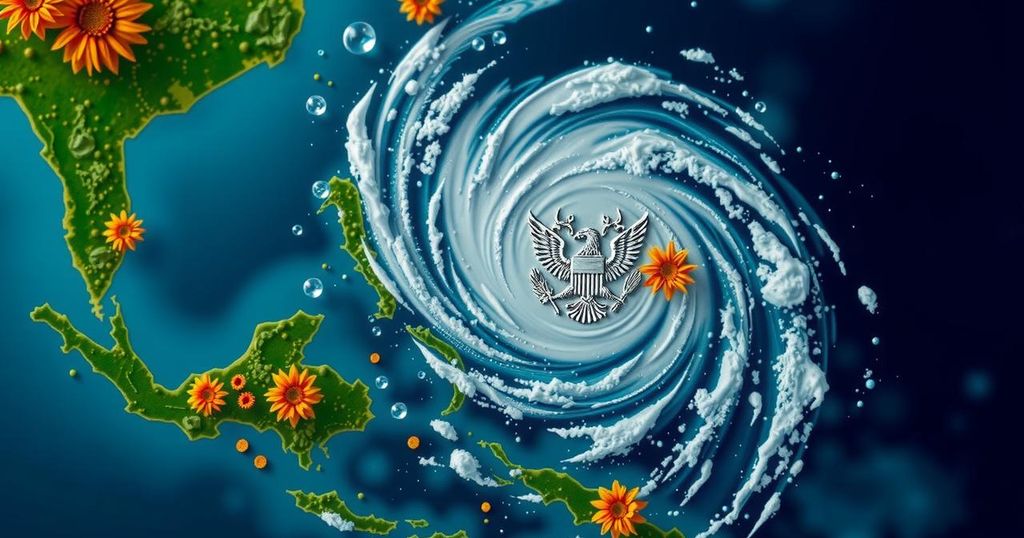Five Key Updates for October 24, 2023
The article outlines important updates involving the U.S. presidential race, the arrival of North Korean soldiers in Russia, a Boeing workers’ strike, Iranian hacking attempts on U.S. election infrastructure, and the effects of Tropical Storm Trami in the Philippines.
Here are five current developments that are noteworthy: 1. Presidential Race: At a recent CNN town hall, Vice President Kamala Harris unequivocally stated her belief that former President Donald Trump embodies fascist tendencies. Harris engaged directly with undecided voters in Pennsylvania, addressing pressing issues such as immigration and abortion access, while emphasizing the need for a transformative leadership approach that distances itself from President Biden. Concurrently, Trump is mobilizing his support, criticizing Democratic candidates at a rally in Duluth, Georgia, all while polls indicate a lack of definitive frontrunners in the race. 2. North Korean Troop Movement: The White House has reported the arrival of at least 3,000 North Korean soldiers in eastern Russia. This alarming development raises concerns that these troops may become involved in the conflict in Ukraine. U.S. Secretary of Defense Lloyd Austin has acknowledged these troop movements, noting an escalation in military cooperation between North Korea and Russia since the latter’s invasion of Ukraine. While U.S. officials do not believe these forces have reached Ukraine yet, the situation continues to evolve, prompting the U.S. and its allies to advance a substantial financial support package for Ukraine. 3. Boeing Workers’ Strike: Approximately 33,000 Boeing employees are continuing to strike after union members overwhelmingly rejected a proposed contract. The International Association of Machinists voted 64% against the recent offer, which has not met the majority threshold necessary to conclude the strike. A core issue for many workers is the demand for the reinstatement of traditional pension plans, which were relinquished in prior negotiations. Financial analysts are warning that Boeing is incurring significant losses due to the ongoing strike, estimated at $1 billion monthly. 4. Iranian Cyber Activities: Iranian state-affiliated hackers are reportedly probing election-related websites across various U.S. swing states. This activity is viewed as an effort to identify vulnerabilities that could threaten the upcoming presidential elections. Microsoft disclosed these findings amid broader concerns regarding Iranian interference in the electoral process, which is being closely monitored by federal agencies. 5. Tropical Storm Trami: The Philippines is grappling with the aftermath of Tropical Storm Trami, which has resulted in widespread flooding and over two dozen fatalities. Government rescue operations are ongoing, with many individuals still awaiting retrieval from precarious situations, such as rooftops. The storm’s devastation calls attention to the region’s vulnerability to natural disasters, with an average of 20 significant storms impacting the Philippines annually.
Current global and national events are intertwined with significant political, environmental, and economic implications. This article highlights crucial ongoing developments, including the dynamics of the 2024 presidential race in the United States, military movements involving North Korean soldiers, labor disputes affecting major corporations like Boeing, cybersecurity threats linked to Iran, and the impacts of natural disasters in the Philippines. Understanding these topics is essential as they capture the tensions and challenges facing various sectors while also spotlighting the interplay between geopolitics and domestic issues.
In summary, the current landscape is marked by significant geopolitical tensions, including military collaborations and cybersecurity threats, alongside critical domestic issues manifesting in labor disputes and political challenges leading into the presidential race. The devastation from tropical storms further illustrates the unpredictability of natural disasters in vulnerable regions. As these narratives develop, they will likely continue to influence public discourse and policy decisions in the United States and abroad.
Original Source: www.cnn.com




Post Comment